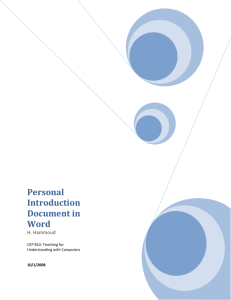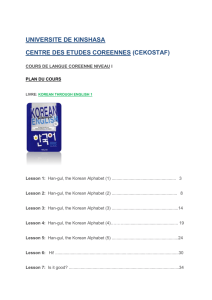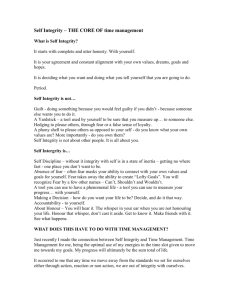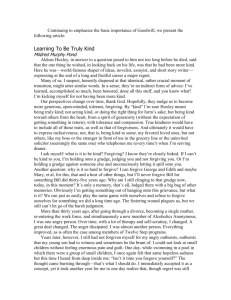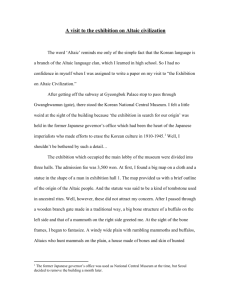final analysis & reflection
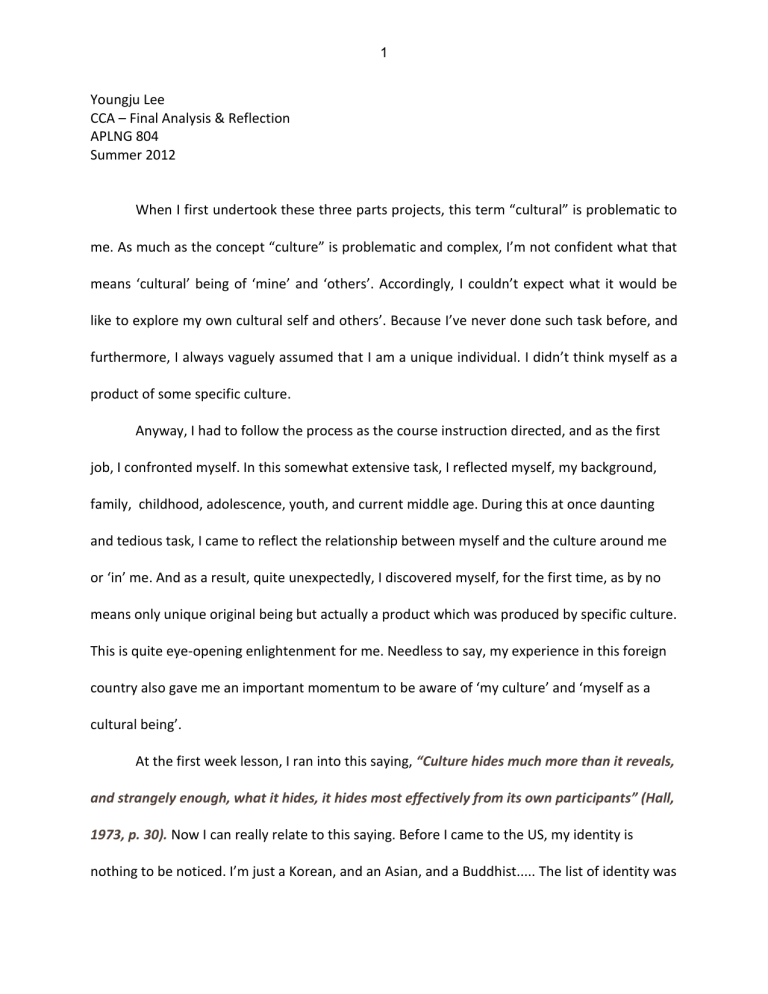
1
Youngju Lee
CCA – Final Analysis & Reflection
APLNG 804
Summer 2012
When I first undertook these three parts projects, this term “cultural” is problematic to me. As much as the concept “culture” is problematic and complex, I’m not confident what that means ‘cultural’ being of ‘mine’ and ‘others’. Accordingly, I couldn’t expect what it would be like to explore my own cultural self and others’. Because I’ve never done such task before, and furthermore, I always vaguely assumed that I am a unique individual. I didn’t think myself as a product of some specific culture.
Anyway, I had to follow the process as the course instruction directed, and as the first job, I confronted myself. In this somewhat extensive task, I reflected myself, my background, family, childhood, adolescence, youth, and current middle age. During this at once daunting and tedious task, I came to reflect the relationship between myself and the culture around me or ‘in’ me. And as a result, quite unexpectedly, I discovered myself, for the first time, as by no means only unique original being but actually a product which was produced by specific culture.
This is quite eye-opening enlightenment for me. Needless to say, my experience in this foreign country also gave me an important momentum to be aware of ‘my culture’ and ‘myself as a cultural being’.
At the first week lesson, I ran into this saying, “Culture hides much more than it reveals, and strangely enough, what it hides, it hides most effectively from its own participants” (Hall,
1973, p. 30). Now I can really relate to this saying. Before I came to the US, my identity is nothing to be noticed. I’m just a Korean, and an Asian, and a Buddhist..... The list of identity was
2 not conspicuous. It was like just default facts. Then, once I was put into different culture, something hidden revealed afresh. For an example, among many things that made me surprised, some American female’s uncovered way of dressing was embarrassing to me. Now
I’ve used to that, but at first I felt at a loss not knowing how to understand that. Another funny instance is their way of calling person. When a younger woman called me with her palm up and bending index finger, I was shocked thinking “How rude she is!”. There are more telling stories relating to etiquette , especially toward elders. We Korean people are taught to use both hands when giving something to elders. We Korean people are always conscious who are elder in relation and the younger is to pay respect to the elder in any case. Or Koreans rarely talk about
‘sex’ with others in public especially. But, here, American people are different!
Lots of this kind of experience told me there are many different expectations or norms between two cultures. And, for sure, I belong definitely to Korean culture. I know that we
Koreans never call other persons that way, or such outfits are considered as crazy if it were in
Korea. So, I’ll never do that in Korea as well as here. In this sense, I’m definitely Korean cultural product and it became obvious only after I witnessed and experienced other culture.
Moreover, I found that more personal and mental things such as interest and taste, experience and value are also much related with the culture which I belong to. For an instance,
I have had great interest in meditation or zen tradition in Buddhism. For me, Buddhism is sort of way of viewing and interpreting the world rather than religion-as it were, exclusive faith in absolute omnipotent being as in Christianity or Islam. It helped me a lot to understand universal human conditions and sufferings, thus I could go on in this painful life with acceptance and
3 understanding. Yet, before this course project, I didn’t recognize that my preoccupation with
Buddhism owed a lot also to my country’s traditional culture.
For another example, I usually have strong sense of responsibility of social problems.
Now I understand this has much to do with my generation's collective experience, especially those who went to the college during 1980s and early 1990s, the period when movement for democracy was fierce in my country. We young college student believed it's our duty to meet the demand of the times. But now I can see, actually that mentality is not so general common attitude which all individuals share. It was a specific cultural phenomenon that only particular contemporaries could be involved in. As said above, now I can realize that even though I’m unique individual, my all parts have something to do with my surroundings, people and culture.
Meanwhile, it never means that there are only differentials among different cultural members. On the contrary, I found my subject Mary and English teacher Janet and I have a lot of things in common. Especially I could see we shared similar value, philosophy, and opinion.
Needless to say, on the surface, we are all different individuals, for sure. But also we have quite many similarities. We are women, we are in our middle age period, we are moms, we can speak English, we have Asian heritage, we are educated... and so on. Yet, what really got my attention is the fact we resemble inwardly much more than these demographic external aspects. We have same value, first of all. All we treasure knowledge and education. And we believe equal rights of all human beings. For more specific example, regardless of each other’s different religion, we were able to openly and amicably talk about each other’s religion.
Furthermore, we reached an agreement all human religions basically have very similar lessons in their core. Love each other, Have compassion, Help each other, Avoid sins, Refrain desires
4
…etc. If we can say a specific religion is also a product of a specific culture, it’s a bit weird but we can infer that all cultures have something very similar at their core. Likewise ethics is almost same in whatever country or society. I think this is why we three different individual from three different cultural background are very similar in many ways in its deep level. Actually I felt as if they are my old friends. Obviously we need more time to develop real friendship, but also it’s obvious that we’re ready internally to build such relationship. So, this was very rewarding and pleasant experience as well as a great chance to realize our essential sameness.
Once I read Dalai Lama’s saying that “In our quest for happiness and the avoidance of suffering, we are all fundamentally the same, and therefore equal.” I was touched by his discernment. Actually I have had exact same thought as his. And also from this cultural exploration project, I could confirm this idea. This is very important point. For if we can integrate an appreciation of this fundamental human equality into our everyday outlook, it will be of immense benefit, not only to society at large, but also to us as individuals. Dalai Lama said, "Whenever I meet people- whether they are presidents or beggars, whether dark or fair, short or tall, rich or poor, from this nation or that, of this faith or that- I try to relate to them simply as human beings who, like me, seek happiness and wish to avoid suffering. Adopting this perspective, I find, generates a natural feeling of closeness even with those who until that moment were complete strangers to me. Despite all our individuals characteristics, no matter what education we may have or what social rank we may have inherited, and irrespective of what we may have achieved in our lives, we all seek to find happiness and to avoid suffering during this short life of ours." (2011, p.28) When I read this, I felt really fortunate myself to
5 meet this great idea of such a great mind. And it's personally real joy to have the chance to verify such idea on my own from this course project.
Next, I want to examine a bit about culture and its complexity. Kumaravadivelu (2008) notes that “culture has stubbornly defied a clear-cut definition” (p. 9) because of its inherent complexity. That complexity is born out of the dynamic and changeable nature of culture as it shapes and is shaped by individuals, societies, and nations. Though largely agreeing with him, I was afraid that this remark could cause unnecessary confusion rather than providing clear understanding. Simply put, by borrowing dictionary definition, “Culture encompasses all human phenomena that are not purely results of human genetics.” Or “Culture is the distinct ways that people living in different parts of the world classified and represented their experiences, and acted creatively.” I think these two definitions from Wikipedia are quite enough, yet one thing I feel lacking in those definitions is the trait of culture. That is, in a world,
“Culture is continually changing by human agents.” In addition, Nieto (2010)’s suggestion to view culture in light of two different aspects, surface and deep structure looks very useful in
bringing focus to the characteristics of culture. Surface structure refers to aspects of culture that are tangible and often taught as “culture” in elementary schools, such as traditional foods, music, dance, and celebrations. Meanwhile, Deep structure of culture refers the expectations, ideals, and social mores of individuals and society. These are less visible and harder to grasp without exploration. As seen from Nieto’s study of youth culture in the United States and
Puerto Rico, deep structure of culture is often veiled unlike surface structure. While surface structure looks similar, there could be many differences in deep structures such as societal values and beliefs of each culture. Conversely, whereas the surface looks heterogeneous, the
6 inner values or beliefs could be homogeneous. And of these two level structures, deep structure is more intrinsic and significant, I think. Because from only this level of understanding, we can make sense who they are (individuals) and what produced or influence the formation of their identity (societies and culture).
Lastly , the most important insights from these activities is, I believe, true critical cultural awareness is to accept and understand we’re living together as a same village dwellers.
The village name is of course, the planet earth. We should see clearly the phenomenon of globalization including its unavoidableness and inevitablity. Its most profound implication is we should cooperate each other . We should acknowledge each other beyond all cultural differences on the basis that we are same human beings.
In the same vein, I want to suggest teaching tolerance should be considered as essential educational goal. Because no matter how quickly and broadly the borders get blurred among countries, the differentiation will never end. Therefore small and large scale of misunderstanding or prejudice, cultural stereotype will continue.
In my teaching context, Korean young adults or youths’ class, I want to be a kind of model who incarnated a tolerance. It is embarrassing to say this, but Korea may be one of the countries where racial discrimination happens often and the awareness is not so high about that. Due to remarkable homogeneity of its population, people usually are not tolerant of being different. Strangeness will cause wariness and more often than not, people tend to have negative prejudice toward strangers. Especially African people or working class people who came from developing countries complain a lot about Korean people’s racism or discrimination.
7
I never want to speak ill of my people. But frankly speaking, it was also a story of me who used to have such parochial mindset. Till I came here, I’ve never been abroad except very short trip to Europe. So I couldn’t have any opportunity to contact various people of very heterogeneous culture from mine, let alone having deep conversation or chance to really know them. For example, about African American people, I could get the vague impression they were suppressed and they are still discriminated. I couldn’t by any means grasp the more total reality. Likewise, toward Jewish people, Muslim people, I had heard nothing but baseless prejudice such as Jewish people are stingy or all Muslims are radical. That’s the reason I’m afraid other people might be like that. I wish next generation of my country would get over such ignorance and learn how to cooperate with other global citizens. They will live in a different world from the previous generation. I really wish the hatred based on unreasonable prejudice and ignorance will disappear and all different individuals can enjoy their rights whatever they are as long as they don’t harm others’ rights. And on the path toward such harmonized world, I wish I could take my role, not only as a English language teacher but also cultural bridge or mediator or guidance for my young learners.



